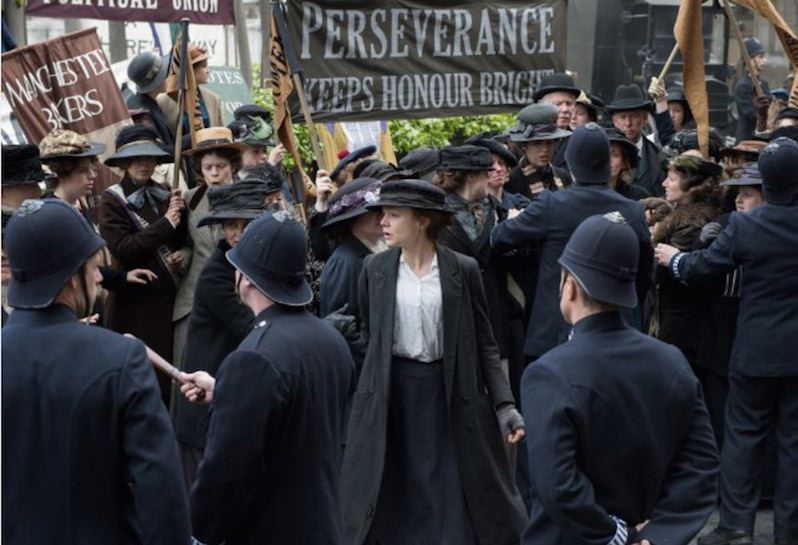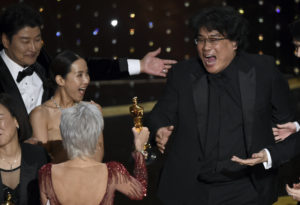‘Suffragette’ Movie Review: Domestic Terrorist or Proud Feminist?
The subtlety of Carey Mulligan’s acting is matched by the delicacy of Abi Morgan’s screenplay in this period film about the women's suffrage movement in England. Told through its most vulnerable activists, the story is as timely today as it was a century ago. Carey Mulligan, center, appears as Maud Watts in this still image from "Suffragette." (IMDb)
Carey Mulligan, center, appears as Maud Watts in this still image from "Suffragette." (IMDb)
Through her threadbare coat, Maud Watts can feel the winds of change. The place is London, and the time is 1912, as the laundress watches a stone shatter a shop window. The hurler of this projectile advocates women’s right to vote and believes, along with movement leader Emmeline Pankhurst, in “deeds, not words.” Is that stone-thrower a domestic terrorist or soldier in a war for equality? If you asked her, Maud would say the former.
At first, Maud is a merely a bystander. Before too long, this wife and mother, portrayed by an electrifying Carey Mulligan, is swept up in the cause. Anyone who sees “Suffragette” — the involving, maddening and essential film from director Sarah Gavron and screenwriter Abi Morgan — cannot help but be swept up with her.
Yes, the face of Meryl Streep, who has a cameo as Pankhurst, appears on the ads and posters for the film. But it is Mulligan (“An Education,” “Far From the Madding Crowd”), as an ordinary working-class woman possessed of extraordinary fortitude, who is its bottomless heart.
Maud, a composite character in a movie with many real-life figures, is an accidental activist. She’s reluctant to risk her job, marriage and child to join a movement where women of means like Pankhurst are generals and women like her are expendable foot soldiers on the front lines.
Is that more dangerous than the sweatshop conditions of the laundry, where girls are molested and women brutalized and threatened for less-than-subsistence wages? Where Maud works more hours than her husband, Sonny (Ben Whishaw), yet makes only 13 shillings to his 19?
When Maud hears suffragettes talk about their aims, the adoring mother and wife gets a glimmer of a future where women are not chattel to their fathers or less than their husbands. And when she testifies to a Parliament committee, led by David Lloyd George, about the conditions in the laundry, the woman accustomed to listening to men gets a taste of being heard.
In a performance of considerable nuance, Mulligan gives the impression not of playing Maud but of living her.
To see her in this role is to see consciousness born. Gavron’s camera focuses in on the determination in Mulligan’s eyes and the implacability of her mouth as Maud braves imprisonment and estrangement from her family.
When I saw Mulligan earlier in the year as Bathsheba Everdene in “Far From the Madding Crowd,” I thought: This is the actress to beat in the Oscar race. Far and away, Maud is the greater performance.
The subtlety of Mulligan’s acting is matched by the delicacy of Morgan’s screenplay. Morgan, scribe of “Shame” and “The Iron Lady,” tells the story of a movement through its most vulnerable activists. She withholds details about Maud and her co-worker Violet (Anne-Marie Duff, likewise wonderful). When they are revealed, they strike the solar plexus with full force.
Gavron previously directed the intimate London immigrant drama “Brick Lane,” for the most part confined to one apartment and neighborhood. She takes to the scope and sweep of this historical epic like a duck to water, telling macro and micro stories simultaneously. The martial tempo of Alexandre Desplat’s score and punchy rhythms of Barney Pilling’s edits work together to create the effect of history stripped down to its fighting weight.
There are many other terrific performances in the film. Most worthy of mention is that of Helena Bonham Carter as chemist Edith Ellyn, who recruits Maud, and who combines cool efficiency with white-hot rage. (Historical note: Bonham Carter is a descendant of Herbert Henry Asquith, prime minister in 1912.)
For Maud, it adds up. Unequal pay. A society tilted against women. A Parliament that pretends to listen to women refuses to consider a suffrage bill. Is she a domestic terrorist, or is she fighting a war because battle is the only language those in power understand? In their portrait of one suffragette and her broader movement, Gavron and Morgan’s story is as timely today as it was a century ago.
Your support matters…Independent journalism is under threat and overshadowed by heavily funded mainstream media.
You can help level the playing field. Become a member.
Your tax-deductible contribution keeps us digging beneath the headlines to give you thought-provoking, investigative reporting and analysis that unearths what's really happening- without compromise.
Give today to support our courageous, independent journalists.






You need to be a supporter to comment.
There are currently no responses to this article.
Be the first to respond.